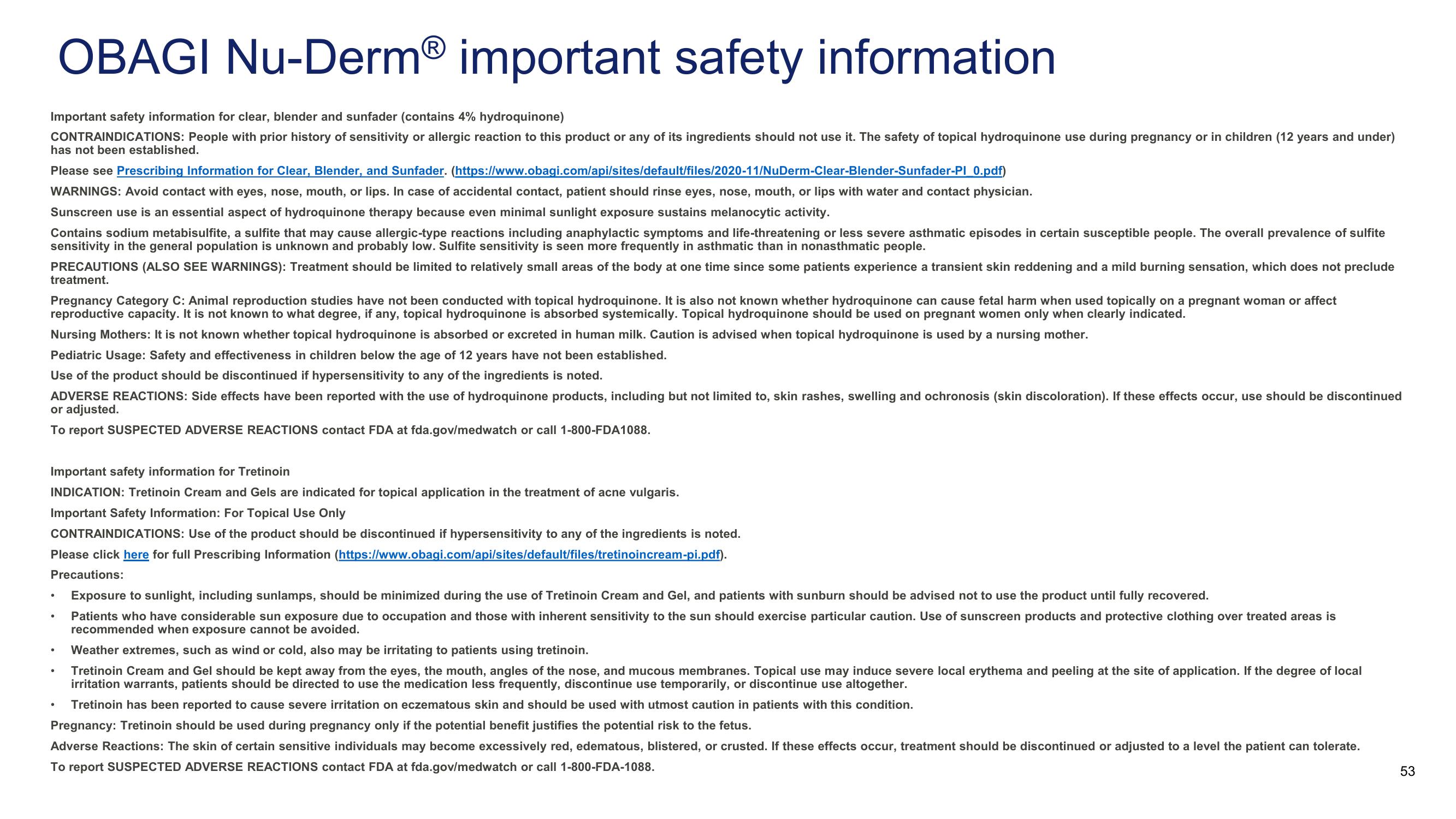Waldencast SPAC
OBAGI Nu-Derm® important safety information
Important safety information for clear, blender and sunfader (contains 4% hydroquinone)
CONTRAINDICATIONS: People with prior history of sensitivity or allergic reaction to this product or any of its ingredients should not use it. The safety of topical hydroquinone use during pregnancy or in children (12 years and under)
has not been established.
Please see Prescribing Information for Clear, Blender, and Sunfader. (https://www.obagi.com/api/sites/default/files/2020-11/NuDerm-Clear-Blender-Sunfader-Pl_0.pdf)
WARNINGS: Avoid contact with eyes, nose, mouth, or lips. In case of accidental contact, patient should rinse eyes, nose, mouth, or lips with water and contact physician.
Sunscreen use is an essential aspect of hydroquinone therapy because even minimal sunlight exposure sustains melanocytic activity.
Contains sodium metabisulfite, a sulfite that may cause allergic-type reactions including anaphylactic symptoms and life-threatening or less severe asthmatic episodes in certain susceptible people. The overall prevalence of sulfite
sensitivity in the general population is unknown and probably low. Sulfite sensitivity is seen more frequently in asthmatic than in nonasthmatic people.
PRECAUTIONS (ALSO SEE WARNINGS): Treatment should be limited to relatively small areas of the body at one time since some patients experience a transient skin reddening and a mild burning sensation, which does not preclude
treatment.
Pregnancy Category C: Animal reproduction studies have not been conducted with topical hydroquinone. It is also not known whether hydroquinone can cause fetal harm when used topically on a pregnant woman or affect
reproductive capacity. It is not known to what degree, if any, topical hydroquinone is absorbed systemically. Topical hydroquinone should be used on pregnant women only when clearly indicated.
Nursing Mothers: It is not known whether topical hydroquinone is absorbed or excreted in human milk. Caution is advised when topical hydroquinone is used by a nursing mother.
Pediatric Usage: Safety and effectiveness in children below the age of 12 years have not been established.
Use of the product should be discontinued if hypersensitivity to any of the ingredients is noted.
ADVERSE REACTIONS: Side effects have been reported with the use of hydroquinone products, including but not limited to, skin rashes, swelling and ochronosis (skin discoloration). If these effects occur, use should be discontinued
or adjusted.
To report SUSPECTED ADVERSE REACTIONS contact FDA at fda.gov/medwatch or call 1-800-FDA1088.
Important safety information for Tretinoin
INDICATION: Tretinoin Cream and Gels are indicated for topical application in the treatment of acne vulgaris.
Important Safety Information: For Topical Use Only
CONTRAINDICATIONS: Use of the product should be discontinued if hypersensitivity to any of the ingredients is noted.
Please click here for full Prescribing Information (https://www.obagi.com/api/sites/default/files/tretinoincream-pi.pdf).
Precautions:
Exposure to sunlight, including sunlamps, should be minimized during the use of Tretinoin Cream and Gel, and patients with sunburn should be advised not to use the product until fully recovered.
Patients who have considerable sun exposure due to occupation and those with inherent sensitivity to the sun should exercise particular caution. Use of sunscreen products and protective clothing over treated areas is
recommended when exposure cannot be avoided.
Weather extremes, such as wind or cold, also may be irritating to patients using tretinoin.
Tretinoin Cream and Gel should be kept away from the eyes, the mouth, angles of the nose, and mucous membranes. Topical use may induce severe local erythema and peeling at the site of application. If the degree of local
irritation warrants, patients should be directed to use the medication less frequently, discontinue use temporarily, or discontinue use altogether.
Tretinoin has been reported to cause severe irritation on eczematous skin and should be used with utmost caution in patients with this condition.
Pregnancy: Tretinoin should be used during pregnancy only if the potential benefit justifies the potential risk to the fetus.
Adverse Reactions: The skin of certain sensitive individuals may become excessively red, edematous, blistered, or crusted. If these effects occur, treatment should be discontinued or adjusted to a level the patient can tolerate.
To report SUSPECTED ADVERSE REACTIONS contact FDA at fda.gov/medwatch or call 1-800-FDA-1088.
●
53View entire presentation